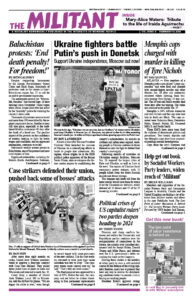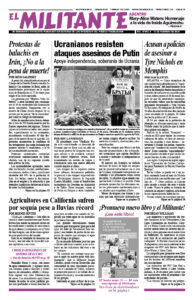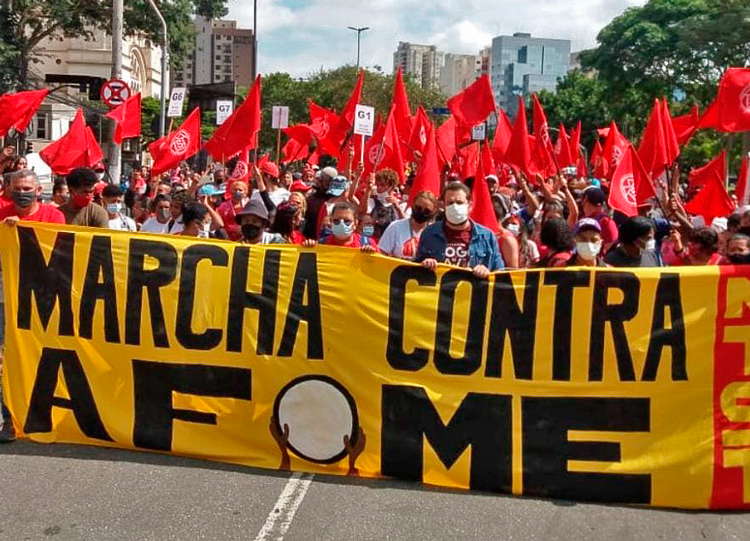The failed attempt on Jan. 8 by thousands of right-wing forces to provoke the intervention of Brazil’s armed forces against recently elected President Luiz Inacio Lula da Silva has set the stage for heightened social and political polarization as the country’s economy continues in a prolonged crisis.
After da Silva won the race in a close runoff election last October, supporters of outgoing President Jair Bolsonaro camped outside military barracks, set up roadblocks and descended on government buildings in the country’s capital, Brasilia, calling for da Silva’s removal.
The military and cops swept up the occupiers, with arrests and now investigations against many of those involved.
Da Silva — who is known as Lula — seeks to deal political blows to Bolsonaro and make gains over his opponents in Congress.
Leading up to the October elections, the country’s courts, business leaders and army closed ranks, pushing back against Bolsonaro’s claim that there would be electoral fraud, reflecting the ruling class’s desire for stability.
Supreme Court Justice Alexandre de Moraes even invited armed forces representatives to do “inspections” of the voting process, setting a dangerous precedent in a country that until 1985 was ruled by a military dictatorship.
The day after the confrontation, the heads of the Senate and the lower house, as well as all the governors of Brazil’s 27 states, joined da Silva in Brasilia to survey the damage.
“We have a new president,” said Luciano Hang, retail billionaire and Bolsonaro supporter. “We have a new government. Let’s support the pilot, so we have a great flight, because I am inside the same plane.”
Lula’s coalition government
The election marks da Silva’s third stint as president. When he was in office from 2003 to 2011 he presided over an economic boom that allowed his government to put in place cash-transfer programs and other modest welfare reforms that won him broad popularity. Since then, Brazil’s economy has been battered by capitalism’s worldwide crisis, for which the rulers have no solution other than to pass the burden onto the backs of working people.
Bolsonaro, a longtime right-wing congressman, was elected in October 2018, presenting himself as the anti-system, anti-corruption candidate, tapping into deep distrust among working people toward capitalist politicians.
His presidency was marked by cuts in social spending, high inflation, growing unemployment and a disastrous handling of the COVID-19 pandemic. Bolsonaro’s racist and anti-women slurs, as well as his dismissal of police brutality and praising the 1964-85 military dictatorship, also contributed to his electoral defeat. More than 12,000 people were killed by the police in 2020-21.
Last year, metal workers went on strike against job cuts and to demand wage increases. There were also protests by public employees against a wage freeze imposed three years ago by the Bolsonaro government. To win support from ruling circles, da Silva has worked to moderate his image and assure global markets they can count on him.
He chose Geraldo Alckmin, a well-known capitalist politician and former political rival, as his vice presidential running mate. Large-scale farmers — a group Lula described as “fascists and right-wingers” in an August TV interview — had been solidly behind Bolsonaro. But after Lula picked Alckmin, Neri Geller, the vice president of the agricultural caucus in Congress, endorsed him.
Bolsonaro, Geller had said, is “bogged down in ideological fights with China, for example, our biggest trading partner, whereas Lula knows how to be a leader to reassure the markets.”
Brazilian capitalists also hope da Silva’s election will reopen talks on a long-sought trade agreement between Mercosur, a South American trade bloc, and the European Union, a deal that has been stalled since 2019.
The actions on Jan. 8 may become da Silva’s greatest opportunity to expand his maneuvering room in Congress, where his backers hold a slim minority.
He hopes the focus on “bolsonarismo” as the main threat to “democracy” and stability will take attention away from the giant problems facing working people in Brazil today.
The surge in some of the biggest emerging markets, dubbed BRICS — Brazil, Russia, India, China and South Africa — plummeted in 2013, a collapse that hit workers and peasants the hardest. And while da Silva has said he plans to relaunch social programs, this will meet a swift backlash from the bosses at home and imperialist investors alike.
Unemployment in Brazil today stands at 14.4%, more than double the rate in 2014. In the last two years the number of Brazilians who say they can’t afford enough to eat has jumped 75%, to 33 million. “Prices are absurdly high,” Carla Marquez, a mother of a 5 year old in Sao Paulo, told Reuters. “I’ve nothing to give her.”
“This country is the third-largest food producer in the world, while 30 million of its citizens go hungry,” Guilherme Boulos, founder of the Homeless Workers’ Movement, told the New Yorker. “Of course there’s going to be polarization!”


